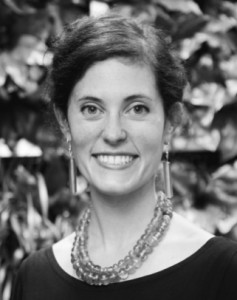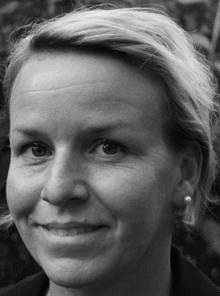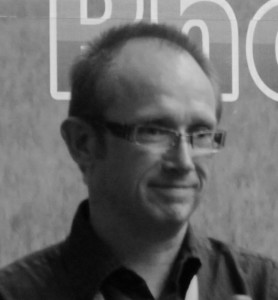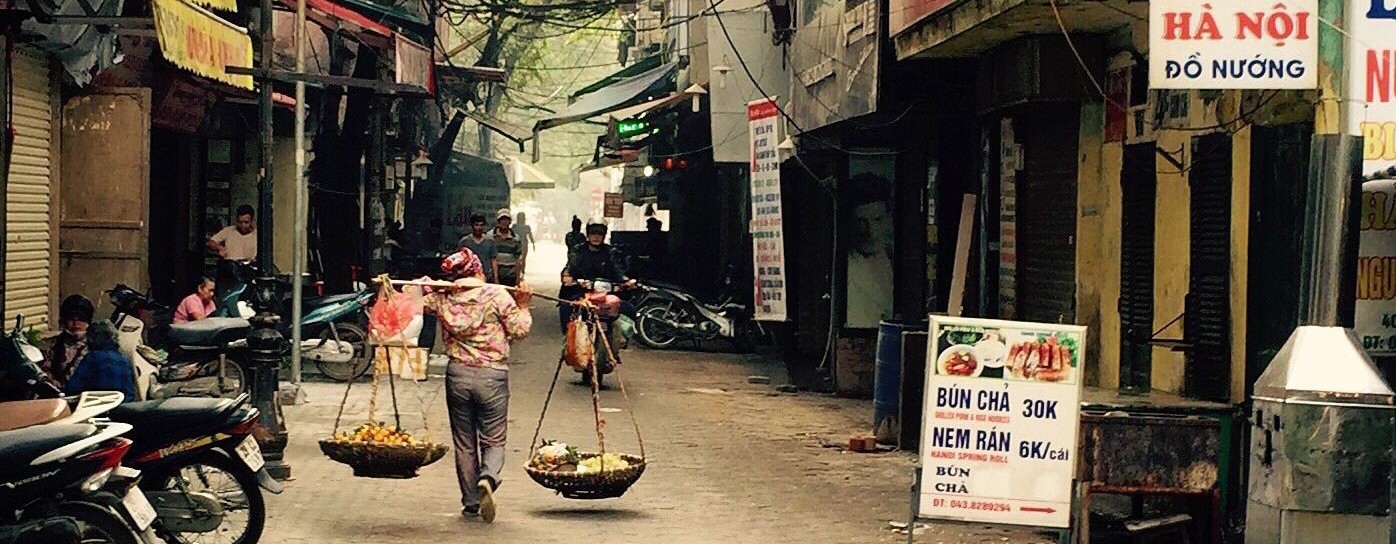
Global Research
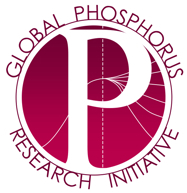 The Global Phosphorus Research Initiative (GPRI) is a collaboration between six independent research institutes in Europe, Australia and North America. Our work is the first major research globally to investigate how phosphorus security can ensure global food security. The GPRI undertakes independent, quality, interdisciplinary research on global phosphorus security for future food production. In addition to research, the GPRI also facilitates networking, dialogue and awareness-raising among policy makers, industry, scientists and the community on the implications of global phosphorus scarcity and possible sustainable solutions.
The Global Phosphorus Research Initiative (GPRI) is a collaboration between six independent research institutes in Europe, Australia and North America. Our work is the first major research globally to investigate how phosphorus security can ensure global food security. The GPRI undertakes independent, quality, interdisciplinary research on global phosphorus security for future food production. In addition to research, the GPRI also facilitates networking, dialogue and awareness-raising among policy makers, industry, scientists and the community on the implications of global phosphorus scarcity and possible sustainable solutions.
The GPRI was co-founded in early 2008 by researchers at the Institute for Sustainable Futures at the University of Technology, Sydney (UTS), and the Department of Thematic Studies – Water and Environmental Studies at Linköping University, Sweden. Today, GPRI members also include: the French National Institute for Agricultural Research (INRA), the Stockholm Environment Institute (SEI) in Sweden, the University of British Columbia (UBC) in Canada and Plant Research International (PRI) at Wageningen University in The Netherlands. Nobel Prize laureate Prof Paul J Crutzen is the first GPRI Ambassador.
For example:
- A phosphorus vulnerability assessment framework to assess in what ways national food systems are vulnerable to phosphorus scarcity, and ultimately to inform adaptive strategies to increase the resilience of that particular food system.
- Long-term sustainable phosphorus scenarios for meeting global food demand (see below).
- A toolbox of sustainable phosphorus measures to meet long-term phosphorus needs for food production.
- A peak phosphorus analysis (revised in 2011) indicating the likelihood of a peak in global production of phosphate reserves within 20-50 years.
- Global phosphorus flows analysis through the food system, which found that approximately
four-fifths of the phosphorus mined for food production never reaches the food the global population consumes because it is lost/wasted at all stages from mine to field to fork. - Doctoral thesis entitled ‘The Story of Phosphorus: Implications of global phosphorus scarcity for food security’ which set out the multiple dimensions of phosphorus scarcity & defined global phosphorus security.
Interactive Future Phosphorus Scenarios
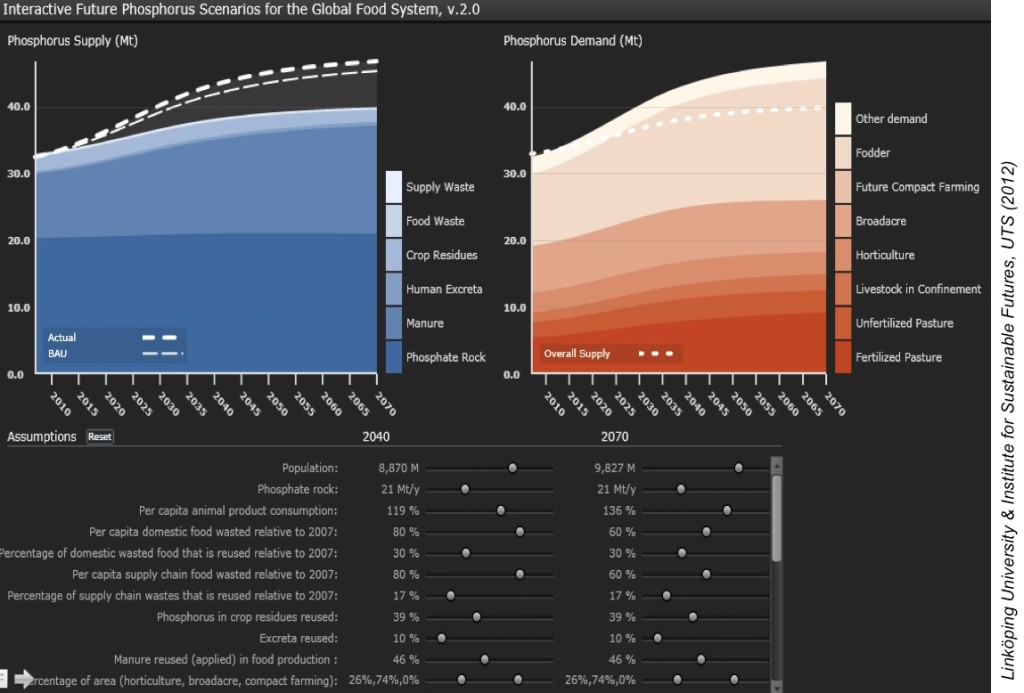
Achieving phosphorus security is likely to require an integrated approach. This means recovering phosphorus from all sources (ranging from manure and excreta, to food waste and crop residues), and, finding innovative ways to substantially reduce the long-term demand for phosphorus (through wide ranging measures such as phosphorus use efficiency in agriculture, changing diets and reducing food waste in supermarket and household bins). Developing and implementing practical solutions to meeting long-term future phosphorus demand will involve substantial technical and institutional changes. The interactive future phosphorus scenarios v2.0 allows users to select assumptions for 26 parameters to determine how phosphorus demand for food security could be attained in globally in 2040 and 2070. These scenarios present a significant opportunity for understanding future implications of the current business-as-usual trajectory, future possibilities and options, and importantly, provides a tool for visualization-supported deliberation among scientists, policy-makers, industry, the community and other key stakeholders related to different aspects of the phosphorus-food system. Version 2.0 presents an excellent basis for this, with opportunities for improvements to input data quality, interactivity with respect to feedback and linkages to other resources.
- The Institute for Sustainable Futures launched the National Strategic Phosphorus Advisory Group in 2012 to provide high-level advice on key aspects of the three-year Australian Sustainable Phosphorus Futures project and ensure research outcomes will be relevant, credible and consistent with recent scientific, policy and industry advancements. Members include high-level representatives from government, industry and the scientific community. 1
- GPRI members were invited by UNEP to co-author the UNEP 2011 Yearbook chapter on Phosphorus & Food production. unep.org/yearbook/2011
- A competitive EU tender on Sustainable Use of Phosphorus was awarded to GPRI members in 2010 to investigate the implications of phosphorus scarcity for EU Member States. 12
- GPRI members issued a Statement on Global Phosphorus Scarcity in direct response to the 2010 IFDC Report on World Phosphate Reserves & Resources. http://phosphorusfutures.net/files/GPRI_Statement_responseIFDC_final.pdf
- GPRI contributed to the EU Parliamentary “Report on a resource-efficient Europe” via a strong recommendation to include phosphorus resource governance. The Report ultimately recommended ‘virtually 100% reuse by 2020’ of phosphorus with funding support from the EU.
- The GPRI website was launched in 2008 and is key platform for global outreach with a growing number of visitors, which has the potential for further expansion. phosphorusfutures.net
- GPRI hosted the 3rd Sustainable Phosphorus Summit in Sydney 29 Feb – 3rd Mar 2012. The Summit produced the Blueprint for Global Phosphorus Security15; initiated the Sustainable P Postgraduate Network; undertook a P Footprint analysis of the Summit; and established the Sustainable Phosphorus Summit Scientific Committee to develop future international events. http://sustainablepsummit.net
- The Global Phosphorus Network was developed by the GPRI in 2010 as a public platform aimed at improving scientific understanding and fostering public debate on sustainable phosphorus use, facilitate networking and new partnerships between researchers, policy-makers and industry globally, increase global awareness of the phosphorus scarcity challenge and of sustainable solutions. globalPnetwork.net
- GPRI members are frequently interviewed for TV, radio and print media as experts on the phosphorus issue. Recent media includes Foreign Policy, Nature Magazine, The New York Times, Le Monde, Norwegian Broadcasting Corporation, SPIEGEL International, Scientific American. 9
- GPRI members are also frequently invited to write journal articles and present keynote speeches at international scientific and industry conferences, such as the Phosphates 2010 Industry Conference in Brussels in March.
Co-founder and Secretariat:
Institute for Sustainable Futures (ISF), University of Technology Sydney
Australia
Co-founder:
Department of Thematic Studies – Environmental Change, Linköping University
Sweden
Member:
National Institute for Agricultural Research (INRA)
FRANCE
Member:
Civil Engineering Department, University of British Columbia (UBC)
CANADA
Member:
Stockholm Environment Institute (SEI)
SWEDEN
Member:
Plant Research International, Wageningen University
THE NETHERLANDS
GPRI team bios and contact details:
Dr Dana Cordell
Director of GPRI
Research Principal
Institute for Sustainable Futures, University of Technology Sydney
PO Box 123, Broadway, NSW 2007 AUSTRALIA
Email: Dana.Cordell@uts.edu.au
Dr Dana Cordell is a Research Principal at the Institute for Sustainable Futures at the University of Technology Sydney where she undertakes and leads independent research projects on sustainable food, resource and sanitation futures. She co-founded the Global Phosphorus Research Initiative in 2008 with colleagues in Sweden and Australia, as an outcome of her doctoral research on the ‘Sustainability implications of global phosphorus scarcity for food security’, which she undertook jointly at the Institute for Sustainable Futures and Linkoping University in Sweden. The GPRI has since expanded to represent six leading research institutes across Europe, Australia and North America, and Dr Cordell most recently attracted Nobel Prize laureate Professor Paul Crutzen as the GPRI’s first Ambassador. In addition to interdisciplinary research on global phosphorus security, the GPRI facilitates networking, communication and engagement between policy makers, industry, scientists and the public regarding the risks and opportunities to our food systems associated with the global phosphorus challenge. Dana’s research contributions to the emerging field of global phosphorus scarcity and security has led to numerous prestigious recognitions including one of Australia’s top science prizes – the Eureka Prize for Environmental Research (2012), a position in 100 Women of Influence (2013) and the Top 100 Most Influential People (Sydney Magazine, 2012). Due to her reputation as a science leader in the field of sustainable food security, Dr Cordell is frequently invited to provide expert opinions, reviews and interviews at the request of numerous international and national bodies including: government (e.g. UNEP, Office of the Chief Scientist of Australia, European Commission (DG Environment), UK Parliament), media (e.g. BBC, Lateline, Nature, ABC Catalyst, Radio National, AFR), industry (e.g. Australia Institute for Health and Welfare). Most recently, Dr Cordell was invited by the Chief Scientist of Australia to sit on the Expert Working Group to determine the top research priorities related to ‘Managing our Food & Water assets’ in 2013.
See: http://datasearch.uts.edu.au/isf/staff/details.cfm?StaffId=2446
Dr Tina Schmid Neset
Postdoctoral researcher
Centre for Climate Science and Policy Research (CSPR)
SE-581 83 Linköping, SWEDEN Department of Thematic Studies – Water & Environmental Studies, Linköping University
Email: tina.schmid.neset@liu.se
Dr Tina Schmid Neset is a postdoctoral researcher at the Department of Water and Environmental Studies at Linköping University. Her research areas include Material and Substance Flow Analysis studies and Ecological Footprint studies with a particular focus on resource flows and emissions linked to food production and consumption. Tina is currently the head of Climate Visualization at CSPR and co-founder of the Global Phosphorus Research Initiative. She has mainly worked in interdisciplinary environmental projects and is responsible for courses on Sustainable Development and Education for Sustainable Development at LiU.
See:http://www.tema.liu.se/tema-v/medarbetare/tina-schmid-neset?l=en
Professor Stuart White
Director
Institute for Sustainable Futures, University of Technology, Sydney
PO Box 123, Broadway, NSW 2007, AUSTRALIA
Email: Stuart.White@uts.edu.au
Professor Stuart White is Director of the Institute for Sustainable Futures where he leads a team of researchers who create change towards sustainable futures through independent, project-based research. With over twenty years experience in sustainability research, Professor White’s work focuses on achieving sustainability outcomes at least cost for a range of government, industry and community clients across Australia and internationally. This includes both the design and evaluation of programs for improving resource use efficiency and an assessment of their impact. Professor White has written and presented widely on sustainable futures and is a regular commentator on sustainability issues in the media.
See:http://datasearch.uts.edu.au/isf/staff/details.cfm?StaffId=2309
Dr Philippe Hinsinger
Senior Scientist (Directeur de Recherche 1ère Classe)
INRA, UMR Eco&Sols (Montpellier SupAgro-CIRAD-INRA-IRD)
Place Viala, 34060 Montpellier Cedex 1, FRANCE
Email: philippe.hinsinger@supagro.inra.fr
Deputy Director
UMR Eco&Sols (Montpellier SupAgro-CIRAD-INRA-IRD)
Place Viala, 34060 Montpellier Cedex 1, FRANCE
Deputy Director
GAIA Doctoral School, University of Montpellier
Place Eugène Bataillon, 34095 Montpellier Cedex 5, FRANCE
Philippe Hinsinger has 25-yr research experience since the completion of his PhD, and is internationally recognized for his pioneer work in the field of rhizosphere biogeochemistry, in connection with plant nutrition and the acquisition of poorly-mobile and -available nutrients such as phosphorus. He has been instrumental in structuring the vast community of scientists working on the rhizosphere in Europe, chairing the COST Action 631 from 2004 to 2006 and organizing the RHIZOSPHERE 2 Conference in 2007 in France (+570 participants). Since his highly-cited paper on the bioavailability of phosphorus in the rhizosphere was published in Plant and Soil in 2001, he has been involved in the International Steering Committees of a series of International Symposia on Phosphorus in Soils and Plants, launched in Beijing, China and he chaired and hosted the last one, PSP5, in August 2014 in Montpellier, France (+270 participants). With the support of the GPRI, he also hosted the 4th Sustainable Phosphorus Summit next to PSP5, gathering +200 participants in September 2014. He is currently involved in a large European Research project on breeding cereals for greater phosphorus acquisition efficiency as related to a range of root traits (EURoot), and also acts as external expert in the Imbalance P – ERC Synergy – project coordinated by José Penuelas (Spain).
Assoc Prof Jan-Olof Drangert
Senior Researcher
Dept of Water & Environmental Studies, Linköping University
SE-581 83 Linköping SWEDEN
Email: jan-olof.drangert@liu.se
Assoc Prof Jan-Olof Drangert is a senior researcher at the Department of Water and Environmental Studies at Linköping University. He focuses his interdisciplinary research and consultancy work on sanitation and water issues in urban settings, both historically and in various parts of the world. He combines management and socio-cultural aspects with technical and health issues. He also coordinates research groups and conducts international training activities in ecological and sustainable sanitation.
Professor Donald Mavinic
Professor, Associate Head of the Department
UBC Civil Engineering
University of British Columbia, CANADA
Email: dsm@civil.ubc.ca
Professor Don Mavinic’s research interests cover many different aspects of environmental engineering. Topics include: phosphorus removal and recovery, nitrification and denitrification processes, landfill leachate management, biological waste treatment processes, wastewater residuals treatment, diffused aeration studies, drinking water pipe corrosion studies and disinfection by-products in drinking water.
Dr Ken Ashley
Adjunct Professor, Civil Engineering, UBC
Instructor, BC Institute of Technology
1957 Westview Drive, North Vancouver, BC, V7M 3B1, CANADA
Email: ken.ashley@shaw.ca
Dr. Ashley was a limnologist with the British Columbia Fisheries Research and Development Section at UBC from 1979 to 2005, then was Senior Engineer in Environmental Management at the Greater Vancouver Regional District from 2005 to 2007. He currently is an Adjunct Professor in the Civil Engineering Department at UBC and Instructor in the Batchelor of Technology Program in Ecological Restoration at the British Columbia Institute of Technology. His areas of interest include artificial circulation of lakes and reservoirs, design of oxygenation technology, and the role of nutrients in maintaining productivity in coastal and interior streams, lakes and reservoirs. He obtained his B.Sc. and M.Sc. in Zoology and an M.A.Sc. and Ph.D. in Civil Engineering from UBC.
Dr Arno Rosemarin
Research and Communications Manager
EcoSanRes Programme, Stockholm Environment Institute
Kraftriket 2B, 106 91 Stockholm, SWEDEN
Email: arno.rosemarin@sei.se
Dr Arno Rosemarin is Senior Research Fellow and currently Research and Communications Manager within the EcoSanRes Programme at Stockholm Environment Institute. Arno is an aquatic biologist with a research background in eutrophication, ecotoxicology and ecological sanitation. Arno has been researching the topic of global phosphorus reserves and methods to close the phosphorus nutrient loop in urban sanitation systems since 2003.
See: http://www.sei-international.org/staff?staffid=40
Ian Caldwell
Communications Assistant
Research and Communications
EcoSanRes, Stockholm Environment Institute
Kräftriket 2B, 106 91 Stockholm, SWEDEN
Email: ian.caldwell@sei.se
Between working at SEI, he worked as a research analyst for Jantzi Research in Toronto, Canada. Jantzi Research provides ethical investment research and his focus was on special projects to provide environmental, social and governance screening of investment portfolios. He co-authored the report on the Millennium Development Goals entitled “Sustainable Pathways to Attain the Millennium Development Goals – Assessing the Role of Water, Energy and Sanitation”. He has a Bachelor’s degree in Geography from Queen’s University, Canada, and a Master of Science in Geography from the University of Toronto. His graduate research was focused on carbon sequestration capacity enhancement and its economic policy implications at a study site in Guizhou Province, China.
See: http://www.sei-international.org/staff?staffid=124
Dr Bert Smit
Senior researcher
Plant Research International (Wageningen UR),
Agrosystems Research
P.O. Box 616, 6700 AP Wageningen, The Netherlands
Email: bert.smit@wur.nl
Dr Bert Smit is a senior researcher at the Wageningen University and Research Centre (Wageningen UR). He works at the unit Agrosystems Research of Plant Research International (PRI) on the development of sustainable agricultural systems thereby focusing on nutrients. For phosphorus he works on a more efficient use in agriculture (e.g. by placement techniques) and works together with other institutes to quantify the P-flows in the Netherlands. He is also a member of the Nutrient Flow Task Group (NFTG), a Dutch initiative to draw attention to the depletion of phosphorus.
See: http://www.wewur.wur.nl/popups/vcard.aspx?id=SMIT028&lang=uk

